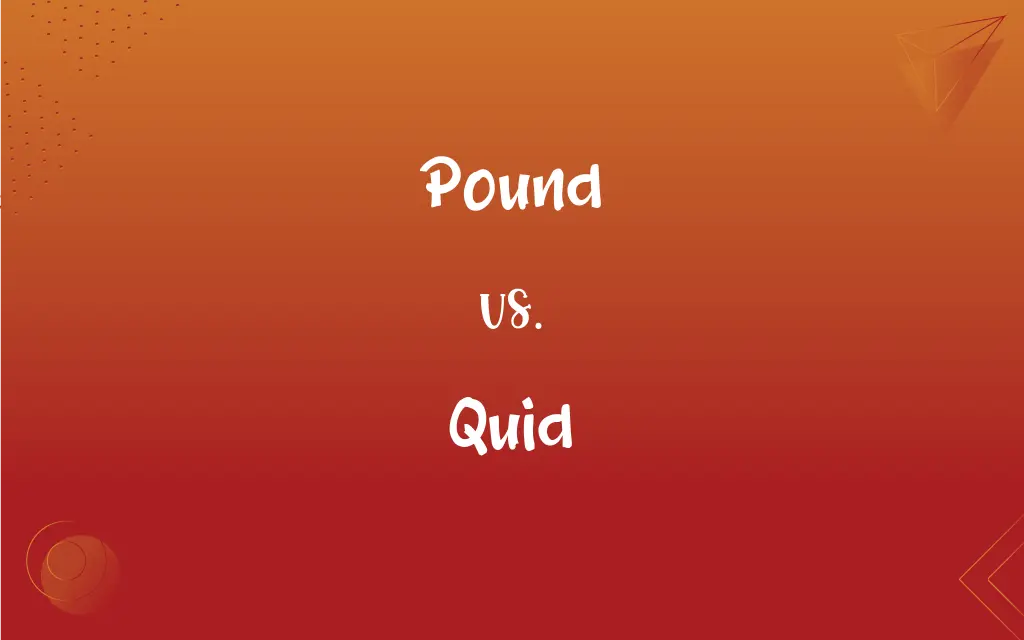Pound vs. Quid: What's the Difference?
Edited by Aimie Carlson || By Harlon Moss || Updated on May 30, 2024
"Pound" is the official currency of the UK, represented as "£". "Quid" is informal slang for the same currency.

Key Differences
"Pound" refers to the official unit of currency used in the United Kingdom, known by its symbol "£". In historical context, the term "pound" is derived from the Latin word "libra", which referred to a measure of weight. On the other hand, "quid" is a colloquial term that Britons frequently use to mean the same thing as "pound". It's essentially the British equivalent of Americans calling a dollar a "buck".
"Pound" is often used in more formal contexts, such as in financial reporting, banking, or international trade. For instance, a bank might report its assets in "pounds" or a store might display the price of an item in "pounds". "Quid", however, is a term you'd more commonly hear in everyday conversation. If someone is discussing how much they spent on a meal or asking how much something costs, they might use the term "quid".
Both "pound" and "quid" can be used to refer to singular or multiple units of the currency. For example, you can have one pound or ten pounds, just as you can have one quid or ten quid. However, in formal writing or when discussing specific amounts, "pound" is usually the term of choice. "Quid" often finds its place in informal discussions or casual chats.
Another distinction between "pound" and "quid" lies in their origins. As mentioned, "pound" has Latin roots. "Quid", however, has an uncertain origin. Some believe it might be derived from the Latin phrase "quid pro quo", meaning "something for something", but this is largely speculative.
Comparison Chart
Formality
Formal and official
Informal slang
ADVERTISEMENT
Usage
Common in banking, trade, official reports
Common in everyday conversation
Representation
Represented by the symbol "£"
No specific symbol
Origins
Derived from the Latin word "libra"
Uncertain, possibly from "quid pro quo"
Pluralization
Used as both singular and plural
Also used as both singular and plural
Pound and Quid Definitions
Pound
To strike repeatedly with great force.
He pounded the door angrily.
ADVERTISEMENT
Quid
Slang for the British pound sterling.
I need a few quid for the bus.
Pound
A unit of currency in the UK.
I spent fifty pounds on groceries.
Quid
A portion of something to be chewed.
He took a quid of tobacco.
Pound
A unit of weight equal to 16 ounces.
The bag weighs ten pounds.
Quid
An act of spitting, especially when chewing tobacco.
He took a quid and spat it out.
Pound
To walk or move with heavy steps.
I could hear him pound up the stairs.
Quid
Something given in return; quid pro quo.
He did a favor, expecting a quid in return.
Pound
A place of confinement or holding.
The dog was taken to the pound.
Quid
Formerly, a sovereign coin of Britain.
He showed me an old quid from his collection.
Pound
A unit of weight equal to 16 ounces (453.592 grams).
Quid
A cut, as of chewing tobacco.
Pound
A unit of apothecary weight equal to 12 ounces (373.242 grams). See Table at measurement.
Quid
A pound sterling.
Pound
A unit of weight differing in various countries and times.
Quid
The inherent nature of something.
FAQs
Can I use the term "quid" in official documents?
It's better to use "pound" in formal contexts.
What is a pound in the UK context?
It's the official currency of the United Kingdom.
How did "quid" come to mean a pound?
The exact origin is uncertain, but it's a long-standing slang term.
Why is the pound symbol represented as "£"?
It's derived from the Latin word "libra", a measure of weight.
How many pennies are in a pound?
There are 100 pence in a pound.
Can I say "quids" to mean multiple pounds?
Yes, but it's more common to just say "quid" for both singular and plural.
Is there a difference in value between a pound and a quid?
No, they represent the same amount.
Can "pound" refer to anything other than currency?
Yes, it can also mean a unit of weight or an action of striking.
Do other countries use the term "pound" for their currency?
Yes, like Egypt and Lebanon, but their "pound" is different from the UK's.
Can "quid" refer to a specific amount?
Generally, it refers to the British pound currency, not a specific amount.
Is the use of "quid" declining with time?
No, it remains a popular and widely understood slang term for the pound in the UK.
Is quid the same as a pound?
Yes, "quid" is informal slang for the British pound.
What's the historical value of a quid?
Historically, a "quid" referred to a sovereign coin in Britain.
Can "quid" mean anything other than money?
Yes, it can also refer to a portion of something chewed, like tobacco.
Is the pound used in countries outside of the UK?
The British pound is specific to the UK, but other nations have their own "pound" currencies.
Is "quid" used outside of the UK?
Primarily in the UK, though English speakers elsewhere might understand its meaning.
How often is "quid" used in everyday conversation?
Very frequently, similar to how Americans might use "buck" for dollar.
Why might someone say "quid pro quo"?
It's a Latin phrase meaning "something for something", referring to a mutual exchange.
How long has "quid" been slang for the pound?
It's been used for many decades, but its exact origin is unclear.
Does "pound" have a plural form?
"Pound" can be used as both singular and plural, but "pounds" is also correct.
About Author
Written by
Harlon MossHarlon is a seasoned quality moderator and accomplished content writer for Difference Wiki. An alumnus of the prestigious University of California, he earned his degree in Computer Science. Leveraging his academic background, Harlon brings a meticulous and informed perspective to his work, ensuring content accuracy and excellence.
Edited by
Aimie CarlsonAimie Carlson, holding a master's degree in English literature, is a fervent English language enthusiast. She lends her writing talents to Difference Wiki, a prominent website that specializes in comparisons, offering readers insightful analyses that both captivate and inform.






























































